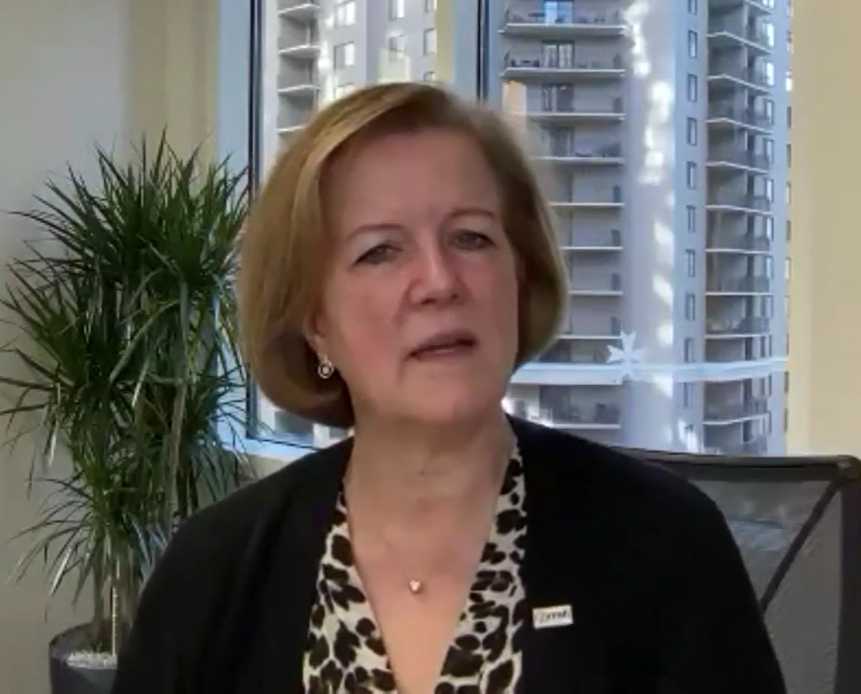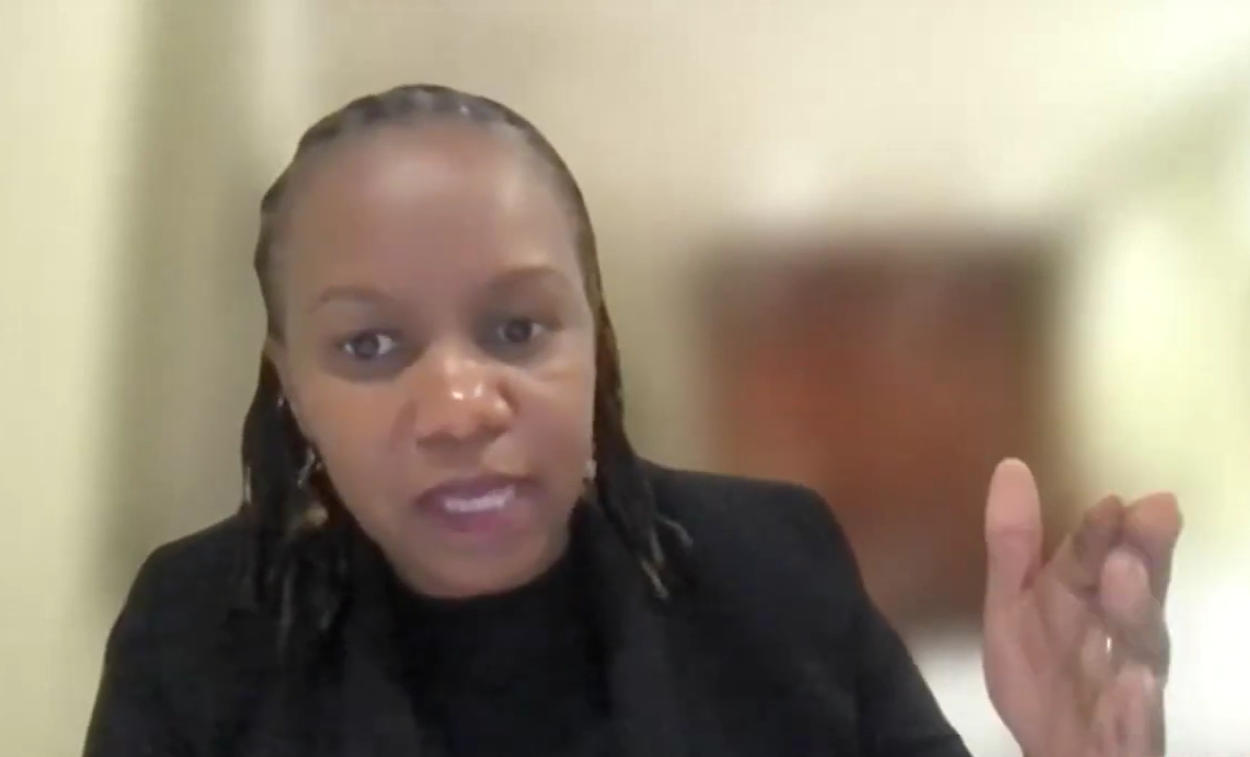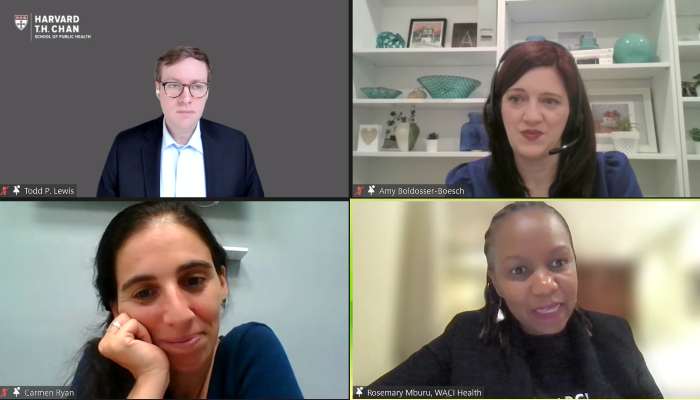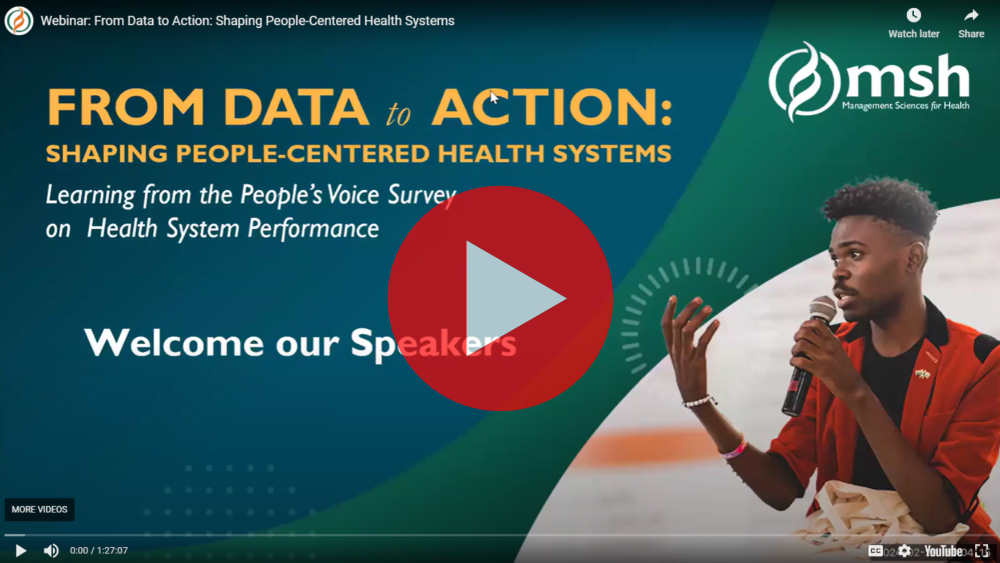Listening to the People’s Voice: MSH Convenes Discussion around New Survey Results
Listening to the People’s Voice: MSH Convenes Discussion around New Survey Results

Imagine a mother in a low-income country with a sick child, walking miles farther than she needs to reach a private hospital, spending more money than she can afford, when a closer, public facility could have helped her child sooner, costing her less.
As hard as it is to imagine this scenario if you live in a wealthy country with adequate health care, this is a scene that plays out every day in the communities we serve. Why would a mother do this? MSH President and CEO Marian W. Wentworth posed this question to more than 150 attendees during the recent webinar, “From Data to Action: Shaping People-Centered Health Systems–Learning from the People’s Voice Survey on Health System Performance.”

Global health professionals and finance experts can speculate, but it’s impossible to know that mother’s motivation unless someone asks her. That’s what the People’s Voice Survey (PVS) is all about. The PVS, a new tool designed by the Quality Evidence for Health System Transformation (QuEST) Network—an initiative focused on the measurement and improvement of health system quality through a multicountry research consortium—aims to “promote health system accountability to the population, track the impact of reforms and policies over time, promote benchmarking across countries and subnational regions, and inform action toward more effective and person-centered health systems.” Collaborators in 18 countries developed the instrument in consultation with policy makers and regional stakeholders, and the research was published as The Lancet Global Health’s Series on the People’s Voice Survey on Health System Performance.
On February 29, 2024, MSH convened global health experts to learn about the methodology behind the survey, unpack the results, and to confer on how to use the findings to shape health system interventions that will meet the needs of the people they serve.
After opening remarks from Wentworth, MSH Senior Technical Director and Practice Area Lead for Health Policy, Advocacy, and Engagement and Integrated Health Care Amy Boldosser-Boesch moderated a conversation on the importance of amplifying the voices of communities to inform actions for more effective and people-centered health systems globally and how the findings of the PVS can be used for advocacy around health system accountability across countries and subnational regions, including specific experiences in Argentina and Kenya.
“We’re hard pressed to say that we truly have a people-centered health system if we don’t know what people think about that system and we aren’t proactively getting their feedback.”
Dr. Todd Lewis, Research Associate at the Harvard T.H. Chan School of Public Health and the PVS workstream lead for the QuEST Network
Boldosser-Boesch pointed out the timeliness of this meaningful dialogue: “The release of this research and today’s discussion are particularly relevant as governments around the world are committing to more people-centered health systems. At the United Nations High-Level meeting on Universal Health Coverage last September, world leaders renewed their commitment to accelerating progress toward achieving universal health coverage and the sustainable development goals by 2030 and specifically committed to advancing social participation to ensure that policies, programs, and plans better respond to individual and community health needs, while fostering trust in health systems.”
First, webinar attendees heard from Dr. Todd Lewis, Research Associate at the Harvard T.H. Chan School of Public Health and the PVS workstream lead for the QuEST Network, who walked them through the design and execution of the survey. Lewis pointed out that many other measures of health system performance (doctors per capita, infrastructure, etc.) are supply-side measures and don’t reflect the perspectives of how the system is working for those who use it.

After all, Lewis points out, “Why would someone come to a clinic if they don’t think that the doctor’s going to be there or there to listen to them and able to solve their problem? Why would they adhere to treatment if they don’t trust the care that they’re getting? If we understand what people want and are getting, and not getting, from the health system, it can help us improve health outcomes.” Lewis also noted that for all the “lofty rhetoric” in global health policy documents about people-centered health systems, “We’re hard pressed to say that we truly have a people-centered health system if we don’t know what people think about that system and we aren’t proactively getting their feedback.”
The PVS aims to provide insights into that perspective, using a questionnaire that’s designed as a rapid assessment of health system performance conducted by telephone with a live, and trained, interviewer. Whereas an exit survey would only capture the opinions and experiences of health system users, this tool, meant to be complementary to other tools, includes perceptions from past and/or potential users as well as non-users. Lewis says it’s designed to be a “light instrument that can provide feedback to governments and ministries of health in a real-time way so that the information isn’t out of date before they can act on it.”
Rosemary Mburu, Executive Director of WACI Health, an African regional advocacy organization that works with MSH on civil society engagement around UHC, reminded the audience that, as the study found, “health is political.” She said highly visible investments in UHC made at the end of the former Kenyan president’s term in office may have contributed to the increased confidence reflected by Kenyans in the survey results. She also highlighted the transition from national to county-level management of health facilities and how strong African leadership during the COVID-19 pandemic led to greater confidence in the health system.

Carmen Ryan, Coordinator of Public Advocacy Strategies at Fundación Huésped in Argentina, and a Core Committee Member, along with MSH, of the SPHERE (Social Participation for Health Engagement, Research, and Empowerment) initiative, reflected on possible uses of the study findings in her work to reform health services and work toward UHC. She spoke of the risk and limitations of the survey and the need to ensure that marginalized voices are adequately reflected in policy decisions, but she remains hopeful. “I see such a huge potential in the data we have and in the potential data we can have in the next year,” explained Ryan. “It’s key to have spaces where civil society activists talk with researchers so we can dig deeper into what the expectations are.”
According to Boldosser-Boesch, MSH is already leveraging some of the survey data in global advocacy around the upcoming World Health Assembly and a resolution on social participation that would solidify global commitments, as well as some specific country commitments.
Following a short question-and-answer period, where attendees queried the study design and next steps for use of the findings, Dr. Dan Schwarz, Vice President for Global Health Systems Innovation at MSH, concluded the program by reminding attendees of the mother with the sick child who Wentworth had referenced at the beginning of the program. “We should never lose sight of that mother because ultimately that is the core of this conversation,” Schwarz said. “She certainly may not know what the objective clinical quality is, but she does have a lack of trust. And if we can’t get past that trust barrier, we’ll never get past the access barrier, which will never get us to high quality actual health care service delivery.”
Schwarz reiterated Lewis’ point that the PVS is not perfect but is meant as a starting point. “Very few data sets are truly made public; very few data sets are owned by the people and democratized to be used by other researchers and policy makers. The PVS is an important step forward to ensuring that the data we collect is directly translated into action for the people in the communities we serve. Ultimately, our obligation is to them, and we must always keep them central to all our planning and service delivery design.”
